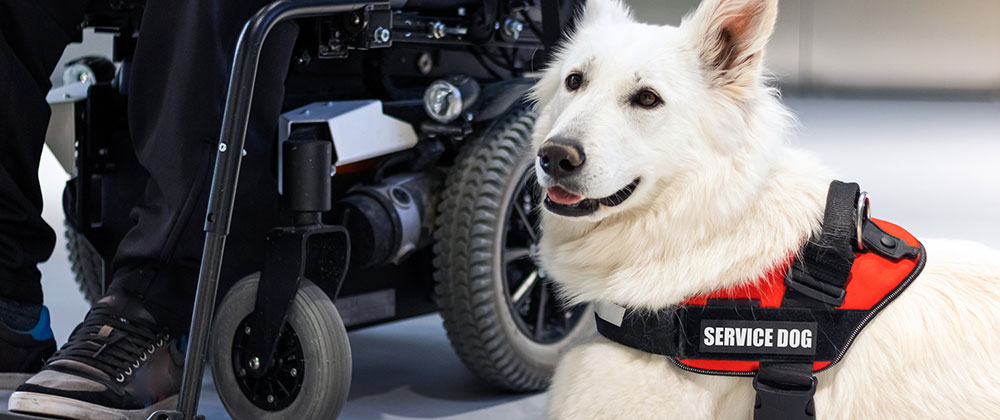In Florida, many disabled people rely on service animals to perform tasks they can’t perform without assistance. Because of the importance of these animals, Florida has a law that protects the rights of disabled people when visiting public accommodations or seeking housing accommodations. If you would like to understand how Florida housing accommodations laws apply to your service animal, Florida condo attorney Herb M. Milgrim can review your situation and explain how the laws apply. Here is an overview of Florida’s service animal law to provide you with some general information about your rights.
Florida’s Service Animal Law
Florida’s service animal law is codified at §413.08, Fla. Stat. (2023). This law protects the rights of disabled people to have their service animals in public accommodations and housing accommodations. Under this law, a service animal is an animal that has been trained to perform specific tasks that are directly related to the owner’s disability to help them with major life functions. Under the law, a disability is defined as an intellectual, physical, mental, sensory, or psychiatric disability.
This law differentiates between service dogs and emotional support animals. For purposes of public accommodations, service animals only include dogs that have undergone rigorous training to perform functional tasks for disabled people. For example, a service animal for a blind person might guide the person as they walk through a restaurant or on a public sidewalk. A service dog for someone with a hearing impairment might alert the person to sounds in the environment, and a service dog for a person with a seizure disorder might alert the individual when they are getting ready to have a seizure and protect them while they are having a seizure.
For housing accommodations, other types of service animals, including emotional support animals, are also allowed.
What Are Public Accommodations?
Under §413.08(c), public accommodations in Florida include the following:
- Airplanes
- Common carriers
- Motor vehicles
- Trains
- Buses
- Boats
- Hotels
- Resorts
- Timeshares
- Amusement parks
- Anywhere else the public is invited (restaurants, stores, museums, etc.)
Disabled individuals enjoy equal access to all public accommodations under §413.08(2). Public accommodations must modify their policies and practices and allow disabled individuals with service animals equal access to their premises and services. They are not required to modify their services to accommodate disabled people with service animals any more than they do for other guests, however.
Disabled people have a right to have their service dogs in all public accommodations that other members of the public are allowed to occupy or visit. The handler must keep control of the animal with a harness, leash, or tether at all times unless the handler is unable to use a harness, leash, or tether because of their disability. In that case, the handler must use voice commands, signals, or other effective methods to control the service animal.
Public accommodations cannot require disabled individuals to produce documentation that their animals have been trained as service animals. They also can’t ask the individual what type of disability they have. However, they can ask whether the animal is a service animal and the types of tasks it has been trained to perform.
If a public accommodation has a policy to hold nondisabled guests liable for damage caused by their pets, they can also require disabled individuals to pay damages for any damage their service animals might cause while on their premises. The service animal’s owner is responsible for caring for their service animal, and the public accommodation is not required to provide care, including food or water, for the animal. Finally, public accommodations may not charge fees or deposits to disabled guests for their service animals.
Housing Accommodations and Service Animals
Florida’s service animal law provides even broader protections for disabled people in housing accommodations than public accommodations. Unlike public accommodations, the law also protects disabled people with other assistance animals, including animals other than dogs.
Under § 413.08(6), disabled people who have service dogs or other types of assistance animals are entitled to equal, full access to housing accommodations. This includes any housing offered for rent, lease, or purchase. A prospective landlord can’t refuse to lease, rent, or sell property to an individual because they have a service animal. They also can’t charge “pet rent” or other fees for having a service animal. However, if a disabled individual’s service or assistance animal causes property damage or hurts another individual on the premises, the animal’s owner will be liable to pay damages.
To qualify for protection in housing accommodations under the service animal law, you must have a recognized disability and have a need directly related to your disability for a service animal.
While disabled people with a need for service animals or other assistance animals are protected, those who are not disabled and misrepresent themselves as needing service or assistance animals are not. People who misrepresent their animals as service animals when seeking access to public accommodations or housing accommodations in Florida can be charged with a second-degree misdemeanor and face potential fines and incarceration.
Contact a Florida Condo Lawyer
If you are disabled and have a service animal but were denied housing because of your disability or the fact that you have a service animal, you should contact Florida condo lawyer Herb Milgrim. Contact the Law Offices of Herb M. Milgrim to schedule a consultation at 954-966-3909.

